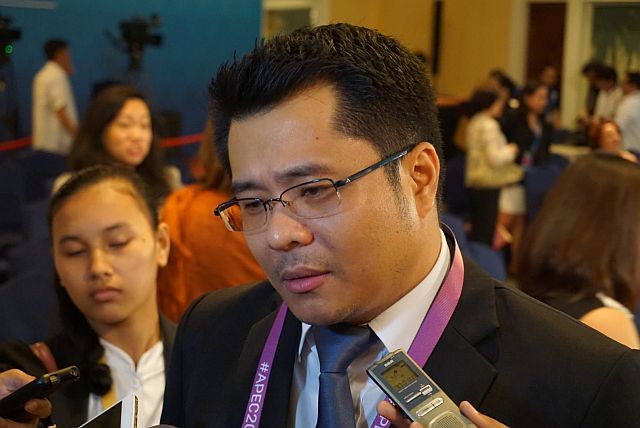Mandaue selected as ‘green’ model town in Asia-Pacific

James Abadia, City Manager of Mandaue City, during tonight’s press conference. (CDN PHOTO/BRAD REDDERSEEN)
APEC experts to study feasibility of planned growth areas, railway
Mandaue City has been selected as a low-carbon model town of the Asia-Pacific Economic Cooperation (APEC) forum, acting Energy Secretary Zenaida Monsada announced at the end of the Energy Ministers’ Meeting yesterday.
APEC experts will be coming over to help study the feasibility of establishing 3 to 5 new growth areas in Mandaue City that will be connected to the rest of Metro Cebu through a mass transit system.
Mandaue City Administrator James Abadia said the growth areas, with a total size of at least 60 hectares, were identified based on the city’s Comprehensive Land Use Plan.
These will be developed in the Mandaue North Reclamation Area, between the second Mandaue-Mactan Bridge and Cansaga Bridge, and in the interior portion of the city. Abadia said the size of each growth area will vary from 20 to 30 hectares.
In these growth areas, Abadia said identified “economic drivers” will be required to construct environment friendly buildings based on the standards specified by Mandaue’s Green Building Code.
Abadia said the grant from APEC will leapfrog the city into a higher level of development but, at the same time, strike a balance between development and sustainability.
“Our problems are traffic, solid waste management, drainage and flooding. If we require buildings to comply with the BERDE rating system, they would be forced to mitigate the impact of their developments on the environment,” he said.
BERDE, or the Building for Ecologically Responsive Design Excellence rating system, was developed by the Philippine Green Building Council (PGBC). Buildings that comply with the BERDE rating system will get tax incentives.
The APEC feasibility study, which is targeted to be completed in six months to one year, will also cover a proposed automated guideway transit (AGT) system that will connect the growth areas to the rest of Metro Cebu.
Abadia said this would be in line with the recommendation of the Japan International Cooperation Agency (JICA) in the Mega Cebu road map.
As a low-carbon model town (LCMT), Mandaue will join three other cities in the Asia-Pacific region that also received technical assistance from APEC experts in urban development planning.
The other low-carbon model towns are Tianjin in China, Da Nang in Viet Nam and Samui Island in Thailand.
The lessons learned by these cities will guide other APEC economies.
Mandaue bested two other nominees for the LCMT project, namely, Krasnoyarsk City in Russia and Subang Jaya in Malaysia.
The project, which was launched in 2010, is part of APEC’s “Green Growth” initiative to promote low-carbon and energy efficient technologies.
Jesus Tamang, director of the Department of Energy (DOE) Policy and Planning Bureau, said the feasibility study should be completed in six months to one year. It will be presented to the energy ministers at the next APEC ministerial meeting. /with Brad Reddersen
Disclaimer: The comments uploaded on this site do not necessarily represent or reflect the views of management and owner of Cebudailynews. We reserve the right to exclude comments that we deem to be inconsistent with our editorial standards.
